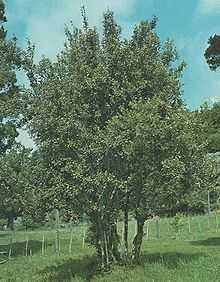Lomatia hirsuta
| Lomatia hirsuta | |
|---|---|
 | |
| Radal | |
| Scientific classification | |
| Kingdom: | Plantae |
| (unranked): | Angiosperms |
| (unranked): | Eudicots |
| Order: | Proteales |
| Family: | Proteaceae |
| Genus: | Lomatia |
| Species: | L. hirsuta |
| Binomial name | |
| Lomatia hirsuta Diels ex J.F.Macbr. | |
Lomatia hirsuta, known as Radal is a tree native to Chile. It grows from Coquimbo to Chiloe (36 to 42°S). It grows on a variety of soils and humidity. It grows on poor soils near ravines.
Description
It is an evergreen tree that measures up to 15 m (50 ft) tall and 80 cm (31 in) in diameter. Light-grey bark with longitudinal fissures. The leaves are alternate, ovate, heart-shaped base, the petioles are about 2–3 cm long, the leaves are 5-20 long and 4–12 cm wide, toothed edge, dark glossy green above and dull below, the nervation is distinct underneath, The flowers are hermaphrodite, greenish-yellow color, covered in a rusty red, the flowers are arranged in axillary clustered inflorescences . Every flower is formed by four linear tepals, 4 sessile stamens and a shorter style. The fruit is a greyish-black follicle almost woody and oval-oblong shaped 2–4 cm long, made up by two valves. Brown winged seeds arranged in imbricate form about 15 mm wide and 5.6 mm long.
Etymology
Lomatia; from the Greek lomas ('fringe'), because of the seeds' edge, hirsuta from the Latin 'hairy'; the Spanish name is 'radal', which in turn comes from Mapudungun radal, the Mapuche name of this plant.
Uses
The wood has beautiful marks, it is similar to Chilean hazel but less elegant. The leaves are used for dyeing wood brown color. It has been planted in Spain[1] and in the British Isles as far north as Scotland.[2]
References
External links
- "Lomatia hirsuta". Enciclopedia de la Flora Chilena. Retrieved 2010-04-03.
- "Lomatia hirsuta". Chilebosque. Retrieved 2010-04-03.